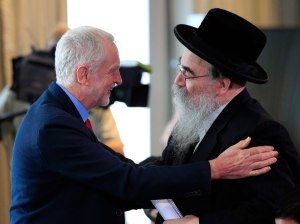 This is a guest post by Ulrich Stephane Savary a Labour Party Campaigner in South Manchester, writer at Labour Vision and a member of Momentum and the Jewish Labour Movement.
This is a guest post by Ulrich Stephane Savary a Labour Party Campaigner in South Manchester, writer at Labour Vision and a member of Momentum and the Jewish Labour Movement.
When the second Intifada started in September 2000, I was in my first year at University. Having joined my local student union, I was really pleased to have been selected as delegate for my student union in the local Pro-Palestine Committee. It was a great opportunity for me to show that I could help in organising a mass protest, with various left-wing organisations, trade unions, Christian, Jewish and Muslim organisations. It also meant that I had to be ready to broker a deal with groups that don’t always agree with each other. It is fair to say that I was aware that he French left, like the left in Britain often spend more time fighting each other than they do in working together.
So the first time I went to my Pro-Palestine Committee meeting, I knew what to expect. When I entered the room, full of trade unionists and left-wing activists all talking seriously about the influence of US imperialism in the Middle East, the role of successive French Government in the development of Zionism amongst the French Jewish Community before WW2, the allegedly corrupted leadership of Fatah and the courageous young Palestinians that were fighting the Israeli war machine with rocks, I felt like I was part of a group of people who knows, against those who don’t. But I soon realised that all them, leaders of various small Trotskyists, Anarchists, and Alt-left organisations were arguing with each other about the role played by the working class in the imminent fall of Capitalism. They were all leaders of small talking shops, tiny so-called working-class parties, with only themselves and their group of followers to believe in them. But they had the passion of those who believe that the revolution will come sooner rather than later. And when you are 19, you want to believe them, even if I couldn’t see the differences between them.
After ten minutes of this noisy and overexcited “brouhaha”, a group in their 50’s emerged from the back of the room to address the rest of the group. They were all members of the powerful CGT / CFDT, the main trade unions in France, and they were all members of either the French Communist Party as well as the Parti Socialiste.
The Trotskyists hated the CGT / CFDT group. The Anarchists, who hated the Trotskyists, hated them even more. The Alt-left left the room in disgust even before the any discussion had really started. After all, they were viewed as bureaucrats, paid by the Union to work for their respective political parties. And the fact that both parties were in a coalition Government together didn’t help make them more popular amongst the “Bolsheviks”.
And yet, as soon as the CGT / CFDT group started to talk, the entire room listened to them. And they made a very simple and valid point. The meeting wasn’t about Israel itself, but was about our solidarity with the Palestinian people. Back then, it was important to get it right. One after another, they reminded the audience, that the far-right will try to use the events unfolding in Palestine as an excuse to attack the Jewish Community, any calls to boycott Israel will be used by them, in their war against the Jews in France or elsewhere. Therefore, this committee wasn’t ready to support such things. What they wanted instead was a principled socialist position on a conflict.
Today, some may find this outrageous, other would even consider this as the ultimate evidence of a so-called Zionist lobby that controls everything, both the left and the right at the same time. But in 2000 in France, in this room packed with so many different political organisations who loved to argue with each other’s, to me this seemed to be the correct political position. Solidarity with the Palestinian people didn’t mean that all Israelis were to blame for the second intifada, so why punish those who were innocent. And this principled political position, 17 years later, is still mine.
When it comes to any political or social movement, socialists usually always start their political analysis from facts, then try to link these facts with what is called “class consciousness”, social classes that have different political and economic goals. This helps Socialists to analyse any social movement in relation to the economy and to the level of political consciousness of the actors of these movements. Karl Marx for instance, saw the political economy as the engine of mind. Therefore, consciousness reflects the political economy. A person’s thoughts tend to be shaped by his or her political and economic circumstances. That’s how all progressive social movements broadly speaking start.
Any Socialist I hope, would agree with me on that, and understand that our capitalist societies are divided between classes having different political and economic interests. However, when it comes to Israel, strong and proud socialists, tend to forget everything they know regarding social movements, the economy, Imperialism, and seem to believe that all Israelis, no matter their social conditions, no matter if they are right-wing or not, rich or poor, pro or against their own government are somehow collectively responsible for the action of their own governments. If we applied this rather strange view on Britain, it would mean that the entire British population would be collectively responsible for the action of their past and present Governments. No more class struggle, just a monolithic nation that act, think and fight together and must all be blamed.
The Boycott, Divestment, Sanctions (BDS) movement and its hidden agenda.
That’s why when socialists give their support to the Boycott, Divestment, Sanctions (BDS) movement, they renounce any kind of socialist analysis of both Israel as a nation and of Zionism as a political and national movement.
What is the main purpose of this movement? They will claim, it is to support the Palestinian People in their struggle against both Zionism and Israel. Let’s take this argument seriously and examine the results of what this campaign has achieved since it started in July 2005.
Did we get an Independent Palestinian state because of the BDS movement? The answer is obviously no. Are the Palestinians any closer to have their own Independent State from Israel? The answer is no. Twelve long years of campaigning have given no satisfactory results. If the real goal of the BDS mobement ss to help the Palestinian in their struggle against Israel, then that strategy has failed to deliver. Therefore, we should question the true goal of the BDS Movement. If after 12 long years of failing to deliver their primary goal, the BDS movement continues with its strategy of “bullying” anyone who wishes to do business, study or just live in Israel, it may mean they have a hidden agenda, something that I think should raise some concerns for all socialists. I would imagine that any socialist would understand that holding all Israelis responsiblr for the actions of their government, can only mean that the BDS movement true goal isn’t really to support the Palestinian people.
We should openly question the true motivation of an organisation, if after 12 years, it hasn’t achieved its goal. Yet, when it comes to the BDS movement, a parts of the British left seem unable to question the true motivation of this movement. And this is a serious concern.
But that’s not all. So many left-wing activists, in the broad sense of the term, will compare the political situation in Israel, with what happened in South Africa during the Apartheid regime, when the black population were considered as inferior by the white population. It was a racist regime, where the black majority living in squalid conditions, couldn’t vote or even sit on the same bus as the white minority.
Is Israel the “South Africa” of the middle East then? If this was the case, no Arab Israelis would have the right to vote. And yet, there are Arab Israelis members of the Knesset such as Masud Ghnam, Dr Jamal Zahalka or Ahmad Tibi. If Israel was really an apartheid state, there would be no Arab Israelis elected. Therefore, if Socialists argue that Israel is an apartheid state to explain why they continue to support the BDS Movement, then they are committing a gross political mistake, as they clearly don’t understand the true nature of Israel, as a modern liberal democracy.
What about those Israeli citizens who refuse to support the action of their Government in the West Bank? What about the thousands of Palestinian and Israeli women who have joined together to march through the desert for peace[5]? Don’t they deserve our support?
To be frank, I personally find the term apartheid inaccurate and inflammatory when applied to the struggle of the Palestinians. It doesn’t help us to understand the true nature of the relationship between the 3.6 million Palestinians who live in the West Bank under military rule and the Israelis settlers who live under Israelis civilian law. The Palestinians living in the West Bank are facing what we can characterise as a modern form of colonialism. And yes, Socialists should oppose it. But the left should also recognise that the Israeli society is as divided as any other society and doesn’t constitute a monolithic bloc around the Israeli government. For us socialists, there is no such thing as national solidarity, but only national class struggle and international solidarity.
If this obsession with condemning Israel, does nothing to advance peace or help the Palestinians, it does however help to enforce the belief that Israelis are all guilty. We should be suspicious of any left-wing organisations obsessed with Israel, to the point that they don’t seem to vigorously campaign on any anything else. And this obsession raises other questions. Why some sections of the British left continue to use a false definition of the nature of Israel. Does it fit another political agenda, something that they don’t want to confess? Let’s say it, aren’t they a bit anti-sematic? Of course, they will vehemently refute the term, and will accuse anyone who raises this as a “Zionist” like it was an insult.
The truth is that many on the left aren’t conscious that their own actions can reinforce anti-Semitism in Britain or elsewhere in the world, however some do embrace it plainly.
The Great International Zionist Conspiracy that will destroy Britain, the Labour Party and the world.
How many times have we seen labour party members, trade unionists or far-left activists claiming that the media is being controlled by Zionist or Israel. This is a recurrent theme of the British left. The BBC and with it, the mainstream media, are all seen to have a hidden agenda against the Labour Party, Jeremy Corbyn and the world in general. And often, they are all Zionists. What about our Parliament or the “right wing of the Labour Party”? Have a guess. They are all under the Zionist or Israelis lobby influence too. Zionists are seen everywhere, and I am sure that some may even believe that I am part of this conspiracy too.
Even if I have utter contempt for any so-called socialists that use such disgusting anti-Semitic propaganda, to explain pretty much everything that is happening in the world, let’s for a moment take their point seriously.
Believing that Israel, as a nation, can corrupt, control, international organisations and then dominate the entire European or American establishment, is basically believing that Israel is the most powerful nation on earth. If taken this seriously, we should all be asking how this tiny nation, who needs the US support to maintain its regional power, can have such power?
This defies logic. In the hierarchy of Imperialist nations, Israel is no more than a small player. It is a regional power, like Iran, Turkey and Saudi Arabia are too. They don’t have the capacity to topple successive presidents in Africa, like France has done so many time since the 1960’s, they don’t have military bases in each continent, like USA have and they wouldn’t have been able to start a war with Argentina, and to win it, like United Kingdom did during the Falklands War in 1982. So how can any socialist explain that “Zionists”, no sorry Israel have such an influence.
The only logical explanation would be that all Zionists have some sort of magical powers. They must be super humans too as how could anyone explain the Zionists can control the world from Tel-Aviv, New York, Paris, London and Frankfurt since 18th Century or even before, whilst no one can see them gathering together at some point. The “illiterate socialists” who believe in a gigantic Zionist worldwide conspiracy, must also believe that Zionists have some sort of supernatural powers. There are no other explanations possible.
When it isn’t Israel itself, it is “the master of the puppets”, Rothschild himself that is behind everything. Of course, Israel and Rothschild must be working together. They are all Jews, no sorry Zionists.
This anti-Semitic Left-Wing Conspiracy has no valid political ground, and yet it is what some “illiterate Socialists” want to believe.
What is their best line of defence? Anti-Zionism isn’t anti-Semitism. When it comes to Israel, for them, it means that Zionism isn’t truly Jewish, therefore it isn’t anti-Semitic to believe that Zionist control the world.
Sometimes they even see Israel as some sort of a capitulation to anti-Semitism. If Jews are leaving Europe to live in Israel, it’s because they refuse to fight for their own right to stay and live in Europe. Even if today many Jews see Israel as a safe place, a last resort against Anti-Semitism, this section of the anti-Zionist left will see them not as victims, but as defeatists, or worse. Let’s not mention to them the Holocaust, to explain why so many Jews consider themselves as Zionists. Some of them will even claim that Zionist and Nazis were working together against Jews, to create a situation where all Jews had to leave Europe.
Even if their Anti-Zionism wasn’t linked to their Anti-Semitism, it is a fact that the Anti-Zionist Left don’t want to offer any credible alternative to Zionism, as they don’t perceive it as a political, national movement worth of interest. As Steve Cohen explained, in his fantastic book “That’s Funny You Don’t Look Anti‐Semitic” the left has historically offered nothing more than so-called “assimilation” to fight against anti-Semitism. Don’t be Jew and then you won’t be victims of anti-Semitism. Even today many on the left have nothing more to offer to the Jewish Community.
“It’s funny you don’t look anti-Semite”
The “Anti-Zionist Left” often uses other tricks to claim that those who oppose them are all wrong. Jewish and Socialist authors have been opposed to Zionism in the past. To be perfectly clear, and especially in the context of Europe before Hitler and the Holocaust, many socialist Jews were against Zionism. Today, some Jews are even deeply involved in the Anti-Zionist BDS Movement and the Anti-Zionist Left. Therefore, the conclusion that the “anti-Zionist” naturally draw is that Anti-Zionism isn’t anti-Semitism.
The Anti-Zionist Left see the world as if it was divided between “good Jews” opposed to the “bad Jews”. The “good Jews” must be against Israel as a state, and must spend their entire political lives opposing Israel. There is no escape because the Anti-Zionist left love using them as evidence that they aren’t anti-Semitic. All accusations of anti-Semitism are simply an attack organised by Israel, the Zionists or the “bad Jews”.
In his essay On the Jewish Question, one of the clearest example of acceptance of anti-Semitism to the point that the individual himself – here Marx- includes anti-Semitism as part of his thinking is this:
ʺWhat is the secular cult of the Jew? Hagglingʺ.
ʺWhat is his secular god? Moneyʺ.
ʺExchange is the true god of the Jewʺ.
ʺThe chimerical nationality of the Jew is the nationality of the merchantʺ.
ʺThe emancipation of the Jew is, in the last analysis, the emancipation of mankind from Judaismʺ.
As Steve Cohen explained, this is not to make the reactionary claim that Marxism as a philosophy is anti-Semitic, but to show that victims of anti-Semitism can assimilate themselves to an anti-Semitic environment to the point that the victims themselves become anti-Semitic.
Therefore, when the “anti-Zionist left” uses Jewish writers as a line of defence against accusation of anti-Semitism, it only proves that they either don’t understand the true nature of anti-Semitism or that they are themselves anti-Semitic.
They aren’t good or bad Jews, but as soon as the “anti-Zionist left” makes this distinction between “anti-Zionist Jews” and “Zionist Jews”, the latter being the bad ones, they just show the true nature of their opposition to Israel. It has little to do with the Palestinian people, but has everything to do with their own anti-Semitism.
Of course, I know that many good and decent people members of this section of the British Left truly believe that they aren’t anti-Semitic, however as Democratic Socialists, it our duty to re-evaluate our own political beliefs, especially when it considers an entire nation responsible for the mistakes of their own government, to the collective culpability of all Jews who are not anti-zionist
It is of the utmost importance that the left starts educating itself on antisemitism, as not understanding the true nature of anti-Semitism can lead to grave political mistakes which in return pave the way for discrimination and racism. If we, Socialists are serious about our support for Palestine, Palestinians and their fight for an independent state, as well as our commitment towards peace in the Middle East, we must step up our game, and work with all of those who truly want peace between Israel and Palestine.
[1] Mainly antifascist skinhead movement.
[2] https://en.wikipedia.org/wiki/Masud_Ghnaim
[3] https://en.wikipedia.org/wiki/Jamal_Zahalka
[4] https://en.wikipedia.org/wiki/Ahmad_Tibi
[5] http://edition.cnn.com/2017/10/09/middleeast/israeli-palestinian-women-peace-march-desert/index.html
 The following is an excerpt from ‘Antisemitism in the Guise of Anti-Nazism: Holocaust Inversion in the United Kingdom during Operation Protective Edge’, a chapter that will appear in Anti-Zionism and Antisemitism: The Dynamics of Delegitimization, ed. Alvin H. Rosenfeld (Indiana University Press, forthcoming).The editor and publisher have kindly agreed to the advance publication of this excerpt in light of its topicality. The UK Labour Party is debating whether to incorporate the International Holocaust Remembrance Alliance (IHRA) definition of antisemitism, including all its accompanying examples, into its own statutes. This part of my chapter sets out why the use of the Nazi analogy to attack Jews, Israelis and ‘Zionists’ should be considered antisemitic, not least because, understanding more deeply the way racism actually works, the best anti-racist scholarship and practice has long abandoned the notion that for racism to be present, a racist subjectivity and motivation, provable to boot, must be co-present.
The following is an excerpt from ‘Antisemitism in the Guise of Anti-Nazism: Holocaust Inversion in the United Kingdom during Operation Protective Edge’, a chapter that will appear in Anti-Zionism and Antisemitism: The Dynamics of Delegitimization, ed. Alvin H. Rosenfeld (Indiana University Press, forthcoming).The editor and publisher have kindly agreed to the advance publication of this excerpt in light of its topicality. The UK Labour Party is debating whether to incorporate the International Holocaust Remembrance Alliance (IHRA) definition of antisemitism, including all its accompanying examples, into its own statutes. This part of my chapter sets out why the use of the Nazi analogy to attack Jews, Israelis and ‘Zionists’ should be considered antisemitic, not least because, understanding more deeply the way racism actually works, the best anti-racist scholarship and practice has long abandoned the notion that for racism to be present, a racist subjectivity and motivation, provable to boot, must be co-present. 


